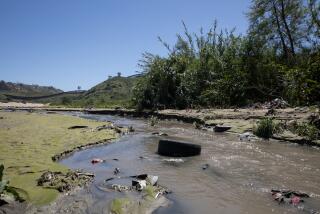Tap Water Poses Risks, Study Says
The water that residents of California’s largest cities get from their taps might meet most government safety standards, but it still poses some health risks and needs to be treated more thoroughly, according to a study scheduled to be released today by an environmental organization.
The report by the Natural Resources Defense Council, titled “What’s on Tap,” concluded that antiquated waterworks and pollution are combining to affect the quality of drinking water residents receive in many cities, including Los Angeles and San Francisco.
Though many urban residents can drink tap water without serious threats to their health, the study concluded that some contaminants still pose a risk, especially to infants, pregnant women, and people with AIDS or other immune system deficiencies. In Fresno, the study found, the risk may be substantial.
The study concluded that pollution from farm and industrial sources was a health concern, particularly for children and pregnant women. Fresno water showed “repeated problems” with nitrates, pesticides and industrial chemicals.
The findings were the result of a national review of tap water data from 19 cities, but the group is only releasing the California results now -- a decision, it says, that is tied to the timing of Proposition 50, a ballot measure that would authorize funds to improve water treatment. Voters next Tuesday will decide the measure’s fate.
“There are still significant risks from contaminants,” said Natural Resources Defense Council senior attorney Erik Olson, one of the study’s authors. “The other issue is that because of deteriorating infrastructure, and the need to improve pipes underground, things are likely to get worse unless significant improvements are made.
“It’s like someone that hasn’t brushed their teeth in years,” he added, laughing. “It may be hidden for a while, but eventually it’s going to catch up with you.”
Los Angeles received generally fair marks in the report, though it cited noteworthy amounts of arsenic and byproducts of disinfectants in the water supply, among other chemicals. The amounts were all within federal standards. The city received good marks for its annual “right to know” tap water reports to the public.
San Diego got a similar grade, though the study noted that in some areas the chemical perchlorate was present in levels higher than a new state standard for government action. And San Francisco received a more critical assessment, which noted that city water does not meet a new standard for byproducts of disinfection known as trihalomethanes that have been linked to cancer. The city has obtained an extension to meet the standards.
More to Read
Sign up for Essential California
The most important California stories and recommendations in your inbox every morning.
You may occasionally receive promotional content from the Los Angeles Times.










